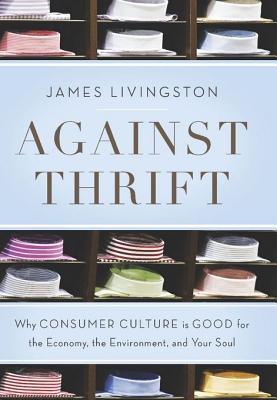
Against Thrift
Why Consumer Culture is Good for the Economy, the Environment, and Your Soul
فرمت کتاب
ebook
تاریخ انتشار
2011
نویسنده
Manolo Santosنویسنده
Ronelle Alexanderنویسنده
Manolo Santosنویسنده
Ronelle Alexanderنویسنده
James Livingstonناشر
Basic Booksشابک
9780465028092
کتاب های مرتبط
- اطلاعات
- نقد و بررسی
- دیدگاه کاربران
نقد و بررسی

August 29, 2011
Since September 11, Americans have been exhorted to spend more; to do otherwise would be un-American, ill-advised, or just plain wrong. Livingston (The World Turned Inside Out) adds his voice to the chorus in his polemic against thrift. Our commonsense notion of how growth happens is completely mistaken, he argues; private savings and investment do not drive growth. He makes a persuasive case for consumer culture: why it’s actually good for the economy, the environment, and our souls, among other things, and that less work, less thrift, more leisure, and more spending are the cures for what ails us. His argument goes beyond the financial; he wants Americans to be less thrifty in the broadest sense, withholding less and desiring more, shunning austerity as a soul-crushing emotional trap. We need a new mindset, argues Livingston, of abundance and spending, if we want to prevent another economic disaster and promote balanced, sustainable growth. His research and reasoning is remarkable, though fairly dry; it’s perfect for the classroom, but may be a tall order for the average reader.

November 1, 2011
Rutgers cultural-economic historian Livingston argues that supply-side economics caused the Great Depression and the Great Recession. In the 1920s and again since the 1970s, national income was misallocated, with far too little consumption funding (working- and middle-classes' wages and salaries) and far more capital formation (corporate profits and dividends) than was needed to keep productivity and the economy growing. Surplus capital inevitably sought alternate outlets, funding speculative bubbles whose collapse devastated the real economy. In fact, the author urges, since the 1920s all efforts to incentivize corporate and superrich job creators have simply funded bubbles. (Graphs and number crunching are in an appendix, subtitled Kuznets Revisited, coauthored with Steve Roth.) Livingston insists that consumer culture, and an economy that recognizes consumption as critical and funds it accordingly, is the solution, despite the political and moral challenges it raises. Against Thrift explores a range of topicsfrom the Populists and Samuel Gompers to W. E. B. DuBois and the advertising industryin defense of the demand-side paradigm change Livingston, drawing on Marx, Keynes, and George Bataille, champions.(Reprinted with permission of Booklist, copyright 2011, American Library Association.)

























دیدگاه کاربران